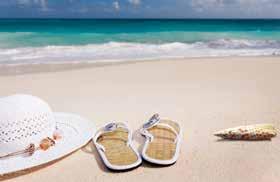
3 minute read
Eco News
TAKE THE CLIMATE GUILT OUT OF YOUR HOLIDAY
by OLIVIA BRIDGEN
Advertisement
The pandemic scuppered international travel for many of us, and understandably most of us have been desperate to get away at the first opportunity. However, with the climate crisis a growing consideration, OLIO’s co-founder Tessa Clarke shares her top tips for holidaying as sustainably as possible.
1. When you’re choosing your holiday, consider where you’re going to travel to and how you’ll get there. The average carbon footprint in the UK is over ten tonnes per person, per year, and we need to get this down to two-and-a-half tonnes by 2030 for global heating to remain within 1.5 degrees. Unfortunately, one of the most carbon intensive things we can do is hop on a plane. A return flight to Rome is 1/4 tonne, to New York is one tonne and to Perth is three tonnes. Maybe consider train or ferry travel instead if possible. 2. Suncream is a must-have, but consider buying coralfriendly suncream so that the harmful chemicals do not bleach the sea’s precious reef builders. 3. Before you go, make sure that you share any food you have in the house that you won’t be able to use. If you can’t give it to a family member or a neighbour, consider sharing it on the OLIO app, which is easy to use and the majority of food listings are requested in less than half an hour.
4. Take reusable water bottles with you. Most countries in the EU have safe drinking water, so you can fill up in your apartment or hotel which is better for the environment and your pocket. It’s estimated that around 8m metric tonnes of plastic ends up in the sea, and it takes 450 years for every plastic bottle to decompose - let’s not be part of the problem. I recommend the Grayl water bottle which filters pretty much everything from any fresh water source, and I estimate it has saved at least 500 plastic bottles since
I bought it. 5. Don’t be tempted to buy everything you need for your holiday brand-new. As the saying goes, the most climate-friendly fashion is the outfit you already have in your wardrobe. The same goes for buckets and spades, towels and everything else you might need.
If there are some items you want but don’t have - like inflatables for the kids or camping equipment, consider trying to source them second hand or borrow them from a library of things or the OLIO app.
CHRISTMAS FAIR WEEKEND
The Greener & Cleaner Christmas Fair Weekend is planned for Saturday 19th November (11am-5pm) and 20th November (11am-4pm) at the Greener & Cleaner Community Hub (upstairs in The Glades next to HMV and Waterstones). There will be handmade and preloved gems for sale, free workshops for kids and adults to make Christmas crackers, baubles, paper cranes and practise Japanese fabric gift wrapping and more. There will also be displays to inspire a greener Christmas, Christmas jumpers and party outfit rails plus face painting. It’s free to attend and take part! For details see greenerandcleaner.co.uk or email Christmasfair@greenerandcleaner.co.uk
KEEPING AN EYE ON FOODBANKS
Did you know that BanktheFood’s free app sends shoppers a list of urgently needed items from their local food bank?
Here are their top tips for donating to foodbanks:
1 Always check the use by dates – foodbanks cannot distribute food that is out of date. 2 Packaging must be in good condition, unopened and undamaged. 3 Foodbanks often need non-food items too, such as deodorant, nappies, sanitary products and pet food. 4 Find out what your local foodbank is most in need of – which helps reduce the need for storage. 5 Foodbanks need long lasting store cupboard food and to be able to offer foods not reliant on using an oven. Ideal things to donate include rice and pasta, lentils and pulses, tinned foods, dehydrated foods such as Pot Noodles or
Super Noodles, dried fruit, UHT and powdered milk, cereal, biscuits, tea and coffee, and spreads (marmite, honey, jam, peanut butter).










